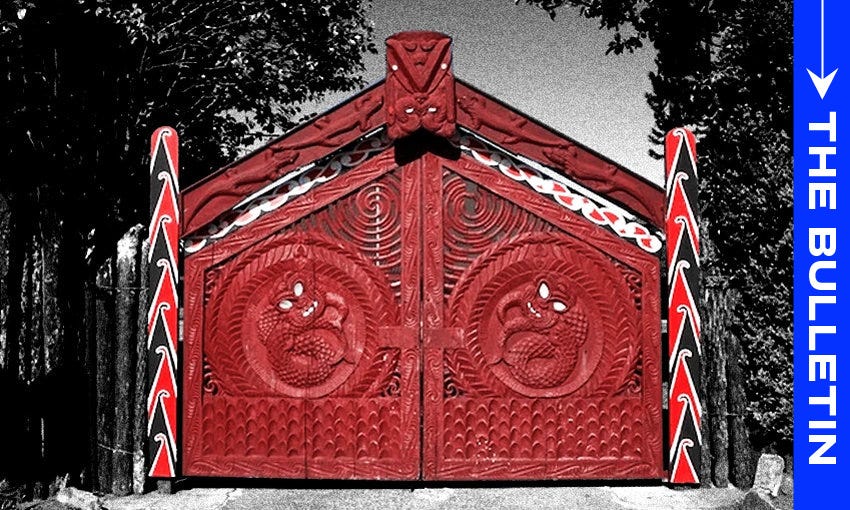A joyful assertion of mana motuhake
Attendance at the national hui for unity surpassed even the most optimistic predictions of its organisers. With Rātana and Waitangi coming up, could the government be persuaded to change its tune?
Mōrena, and welcome to The Bulletin for Monday, January 22, written by Catherine McGregor.
In today’s edition: West Auckland maternity services under severe strain, Te Whatu Ora says; the stories behind the inflation numbers; and long waits for citizenship leave many new New Zealanders frustrated. But first, Saturday’s hui aa motu has been hailed as a historic moment for Māori.
The famous red gates of Turangawaewae Marae. (Photo: Jeff Evans. Additional design: Archi Banal)
Unity hui deemed a huge success
Six weeks ago Māori King Tuheitia called for a hui aa motu – a national hui for unity – to take place at Tūrangawaewae Marae just outside Ngāruawāhia. On Saturday the number of people who heeded his call was estimated at around 10,000, far exceeding organisers’ most optimistic predictions. “Every seat, everywhere, was taken. There was hardly standing room,” writes John Campbell in this excellent long-read. The hui was called by Tuheitia “not so much to challenge the government as to challenge Māori to stand up for themselves”, writes Aaron Smale in another highly recommended read on Newsroom. The Spinoff’s Tommy de Silva was also there and came away with 10 memorable quotes from the day including this rhetorical question from one attendee: “Why did we have to wait for Act to muck around with the Treaty for us to come together?”
Treaty Principles Bill prompts concern within justice ministry
While, as Mihi Forbes notes, the hui was concerned more with “what a future looks like for Māori” than with “agitators like David Seymour or Winston Peters” Act’s Treaty Principles Bill, which seeks to redefine key principles of te Tiriti o Waitangi, certainly added urgency to the discussions. The planned bill, which is expected to be tabled as early as May, was thrust back into the spotlight on Friday when 1News was leaked a draft Ministry of Justice memo expressing concerns. The bill proposes to change the nature of the principles in a way “not supported by either the spirit of the Treaty or the text of the Treaty”, the unnamed memo author wrote. National says it will support the bill only to its first reading, and PM Chris Luxon has told Kingitanga in private that his party “would not let the bill get to a second reading”, Aaron Smale reports. “He was challenged to just stand up and say that publicly. To date, he hasn’t.”
For the government, a tense few weeks ahead
Te hui aa motu will be followed by Rātana this Thursday and Waitangi in early February. These three events “will undoubtedly shape the dynamics of Māori-government relations in the coming year”, says RNZ’s Ella Stewart, who notes that the political environment threatens to make each a particularly tense occasion. For the first time since 2009, Kīngi Tūheitia will be attending Waitangi, reports Campbell. “Symbolic? Yes. Significant? Yes.” Luxon and other senior government ministers were a no-show on Saturday, as were the entirety of NZ First and Act. Their lack of interest indicates “they have not grasped the full political risk from a unified opposition to its plans that may emerge in the wake of the gathering” writes Vernon Small in the Sunday Star-Times. “Hikoi and protests, which were already evident in the wake of the coalition agreement, are not the half of it. Iwi now have the economic power, allied to intellectual grunt, legal precedence and in-iwi legal expertise to make Christopher Luxon’s political life a misery.”
Housing another area of unease
Beyond the Treaty Principles themselves, government policy is raising concerns about the future of many sectors which impact Māori. One is housing, where the outlook seems bleak indeed, write Anne Te One and Jacqueline Paul this morning on The Spinoff. Under the new government, initiatives that were set up to improve Māori access to housing are being dismantled. For example, the associate minister of housing (Māori housing) role has been disestablished, as has the associate housing ministership focused on homelessness. They’re both troubling developments given that Māori are far more likely to be homeless and far less likely to own their own homes than non-Māori, say Te One and Paul. “Under Te Tiriti o Waitangi… Māori expected to always be able to live and be housed on their land,” they write. “To have so many Māori homeless on their own land is among the most cruel outcomes of colonisation.”
The Spinoff and SparkLab proudly present: Business is Boring Live
Setting the right sustainability strategy for your business
Join host Simon Pound for a discussion with Spark Sustainability Director Leela Gantman and CEO of the Sustainable Business Network, Rachel Brown.
We'll be discussing the steps that businesses of different sizes can take to use technology and tools to track, mitigate and reduce their climate impact.
If you would like to join us, please RSVP: commercial@thespinoff.co.nz by the 26th January
West Auckland maternity services under severe strain – briefing
Te Whatu Ora has warned that Waitākere may run out of maternity beds in 2024, before the expected opening of a new primary birthing facility at Waitākere Hospital in July 2025. “There is a high risk that a person in labour within the Waitākere catchment will present for care and a bed will not be available,” read a 2023 ministerial briefing released to the NZ Herald’s Nicholas Jones. A spokesperson says that while demand is high and will remain elevated through the construction of the new unit, a contingency plan is in place “that includes using maternity beds at North Shore Hospital and postnatal beds at Warkworth, Helensville and Birthcare Auckland”. Occupancy for birthing beds within the Waitematā service (covering West and North Auckland) had been as high as 146%, Jones reports. “The accepted benchmark for occupancy is 75%, based on international guidelines.”
The stories behind the inflation numbers
A mea culpa: when last week I covered economists’ predictions for 2024, I blithely stated that things were looking “rosier” than this time last year – without mentioning those for whom things are very much not rosy. While it’s true that experts expect inflation to drop over the next 12 months, that’s little comfort to those who are doing it tough right now. The Sunday Star-Times (paywalled) spoke to people who are struggling to stay afloat as cost of living pressures continue to bite. Small business owners, pensioners and young people are among those particularly affected. As strategist Kate Smith puts it: “If you’re on a minimum wage or, even a living wage, and if you are leaving university with tens of thousands of student debt, you can work as long as you like but you are not going to get ahead.”
The Spinoff is powered by its supporters
In 2023, Spinoff readers funded some of our most beloved, well-read, impactful work. Help Me Hera, The Cost of Being, powerful longreads, Election 2023 coverage, laugh-out-loud satire, Auckland stories, Wellington stories, Christchurch stories and everything in between were powered by Spinoff members and donors. If you did support us, thank you from all of us at The Spinoff. If helping fund well-crafted and insightful journalism is on your list for 2024, donate today or sign up to become a Spinoff member.
Click and Collect
Thousands of people are still waiting at least a year for their New Zealand citizenship applications to be approved.
As temperatures peaked across the country, a number of teens passed out on an aircon-less bus returning from Soundsplash on Sunday.
New Zealand’s '“whingiest region” according to council data.
Why is there a wall blocking the Takapuna-Milford coastal walkway?
Despite the city boasting the fastest growing population in Aotearoa, Tauranga CBD is “dead”, locals say.
Feeling clever? Click here to play 1Q, Aotearoa’s newest, shortest daily quiz.
Privacy waivers allow patients to pass their confidential health information to the media. So why is Te Whatu Ora declining to honour them, asks Eda Tang. Lucy Black looks back on a childhood where reading was everything. Michèle A’Court shares her most memorable TV moments (including her own). Gabi Lardies wonders why every bikini bottom seems to be a thong these days. Venetia Sherson writes about magpies, “those evil f**kers”, and considers which birds are the most and least lovable.
Sporting snippets
Despite chasing a seemingly doable 134-8, the Black Caps were dismissed for just 92 by Pakistan, soundly losing yesterday’s T20 match in Christchurch.
Fans may complain about it, but kicking the ball in rugby tends to lead to more success than carrying it.
Got some feedback about The Bulletin, or anything in the news? Get in touch with me at thebulletin@thespinoff.co.nz.
If you liked what you read today, share The Bulletin with friends, family and colleagues.












The very LEAST the NACTFIRST politicians opposed to Te Tiriti & improving Maori housing, health, education etc. outcomes (which is also excellent for the rest of Aotearoa just quietly!) is to SHUT UP & stop making fools out of themselves and/or deepening divisions - it does not HELP them, and just motivates people of good will, Maori & Pakeha alike, to work against their re-election & implementation of stupid policies like trying to limit the use of Te Reo ...